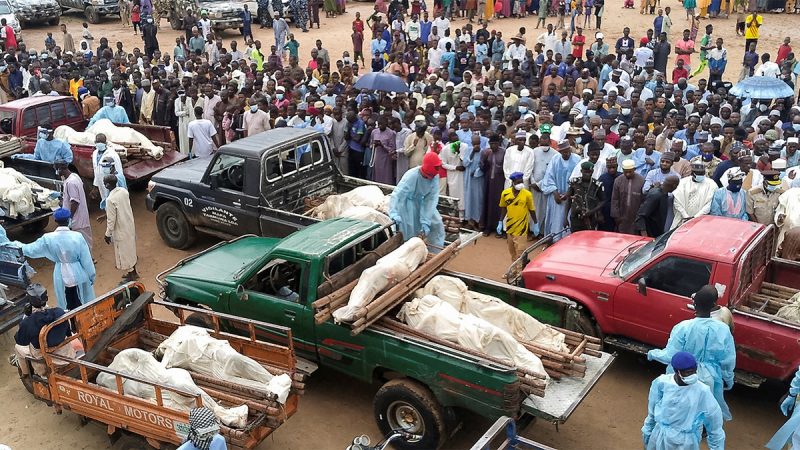
‘Genocide can’t be ignored’: GOP lawmaker backs Trump’s threat of military action in Nigeria

Republican Rep. Riley Moore said the United States could take a range of actions — including sanctions and ‘even kinetic military action’ — in response to what he called the ‘genocide’ of Christians in Nigeria.
Trump designated Moore, a member of the Appropriations Committee from West Virginia, along with Chairman Tom Cole, R-Okla., to lead an investigation into the killing of Christians by Islamist militants in the African nation.
Frustrations with the matter boiled out into the open when Trump this week designated Nigeria as a country of particular concern and ordered the Pentagon to prepare to intervene militarily.
In a video on Truth Social this week, Trump threatened to ‘do things to Nigeria that Nigeria is not going to be happy about’ and ‘go into that now-disgraced country guns-a-blazing.’
Moore told Fox News Digital the designation unlocks ’15 different levers’ the administration can use against Nigeria, including halting arms sales, freezing aid and sanctioning officials or institutions accused of ignoring or enabling religious killings.
‘All options are on the table here for this, even kinetic military action,’ Moore said. ‘That could mean targeted, strategic counterterrorism strikes to get rid of some of the top leadership if that’s what it takes to stop the killing.’
‘We’ve been providing security assistance to this country since at least 2009 – billions of dollars worth of arm sales, training and equipment that they’ve received. And it’s a question of prioritization in what’s important to them. And clearly this has not been one of the most important things.’
The West Virginia Republican said he has been working with the House Appropriations Committee and the State Department to identify what he called ‘legislative levers’ that could support the administration’s response. Moore said he’s also consulting with NGOs and Christian organizations ‘on the ground’ in Nigeria to document the scale of the violence.
He described the attacks as a ‘genocide,’ claiming Christians are being killed at a rate of five to one compared with non-Christians. Moore accused Nigeria’s government of ‘looking the other way’ despite receiving billions in U.S. security aid since 2009.
‘They’re not taking this seriously,’ he said. ‘We had a pastor warn the government about an impending attack — they called it fake news. Within 24 hours, that pastor and 20 of his congregants were murdered.’
The Nigerian government denies a genocide is taking place. ‘Portraying Nigeria’s security challenges as a targeted campaign against a single religious group is a gross misrepresentation of reality. Terrorists attack all who reject their murderous ideology — Muslims, Christians, and those of no faith alike,’ the office of the presidency wrote on X.
Moore said he and House Appropriations Chairman Tom Cole, R-Okla., plan to meet with Nigerian officials in Washington this month as part of the investigation, and may even send delegations to the nation. He added that the U.S. could still work with Nigeria’s government if it shows a willingness to confront extremist groups.
‘It’s not all sticks here — there are some carrots in this,’ Moore said. ‘If they’re willing to work with us, this could actually lead to a stronger relationship between our countries.’
The Nigerian government has denied that the killings amount to religious persecution, arguing that extremist and criminal groups target civilians of all faiths.
With a population of more than 230 million, Nigeria’s vibrant and often turbulent cities and villages are home to people of strikingly diverse backgrounds. The country’s more than 500 languages and mix of Islam, Christianity, and traditional indigenous faiths have long been marred by tension.
Nigeria’s faith communities remain sharply divided, with Muslims dominating the northern regions and Christians concentrated in the south.
Christianity took firm root in the 19th century, when freed slaves educated in Sierra Leone returned home as teachers and missionaries — establishing schools, churches, and early congregations that continue to shape southern Nigeria’s identity today.
Despite vast oil and mineral wealth, decades of corruption and mismanagement have left much of the nation impoverished.
Nigeria’s growing cache of lithium, cobalt, nickel, and other rare minerals has drawn quiet U.S. attention as Washington looks to counter China’s dominance in Africa’s critical-minerals market. The Commerce Department and U.S. International Development Finance Corp. have eyed investment opportunities in Nigeria’s nascent lithium industry, but persistent insecurity in mining regions threatens Western access and future development.
For over a decade, Nigeria’s Christians fleeing the nation’s northern half have been subject to the violence of Boko Haram, an Islamist militant group known for its terrorist spectacles. Churches and homes burned, communities vanishing in the group’s night raids.
Numbers are difficult to verify, but the International Society for Civil Liberties and Rule of Law reports at least 52,000 Christians have been killed, some 18,500 abducted and unlikely to have survived, and 20,000 churches and Christian schools attacked between 2009 and 2023.
In 2014, Boko Haram famously kidnapped and enslaved 276 teenage girls in a raid on a high school dormitory. The group regularly arms children as suicide bombers and holds slave markets in captured territories.
But a direct U.S. military campaign would prove difficult with current U.S. assets in the nation and is unlikely, one defense official told Fox News Digital.
The United States currently has no permanent military base in Nigeria, though small teams of U.S. advisors and special operations trainers work periodically with Nigerian forces under AFRICOM programs.
Washington approved about $600 million in security aid to Nigeria over the past decade, mostly focused on counterterrorism in the northeast.

